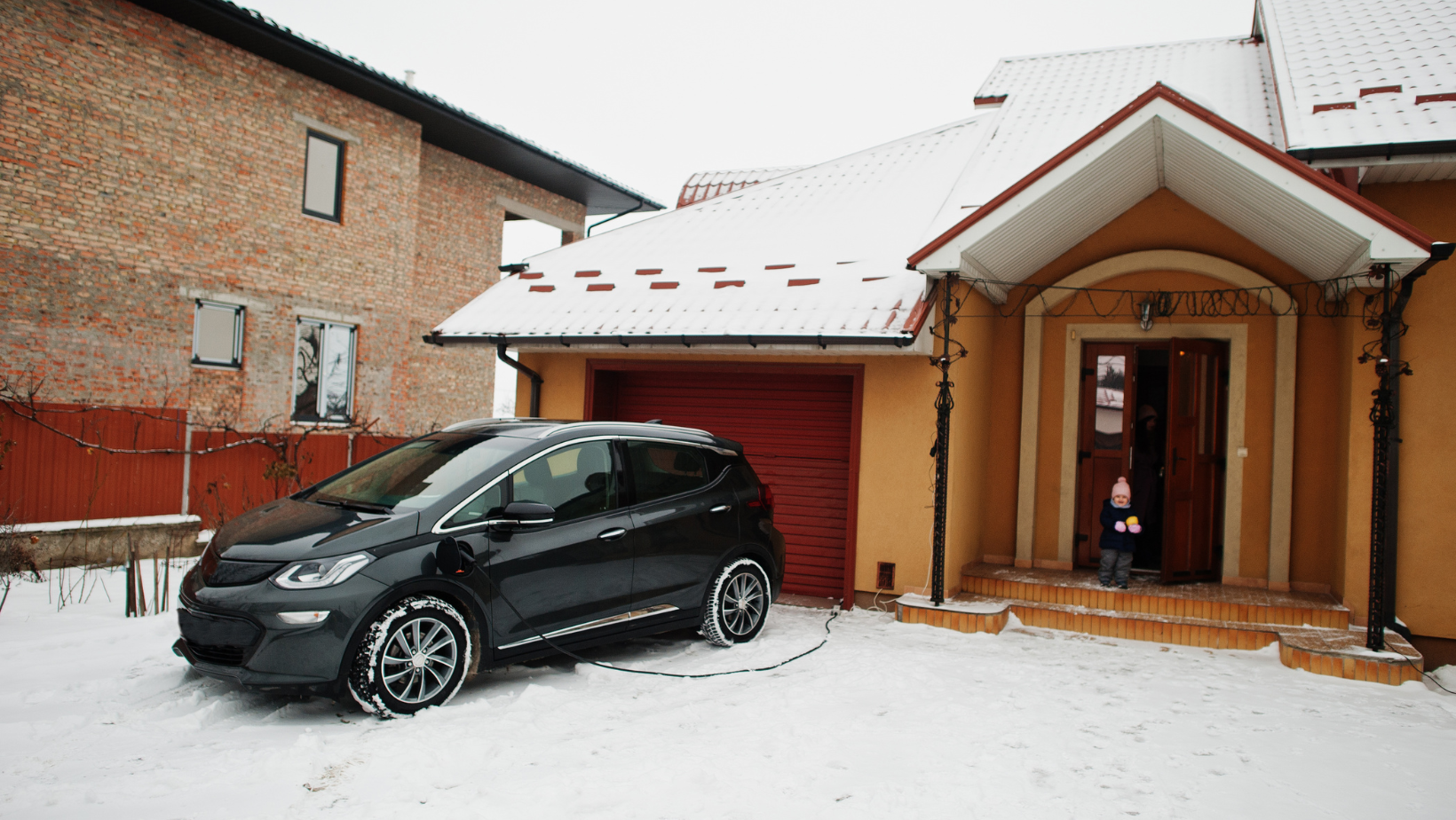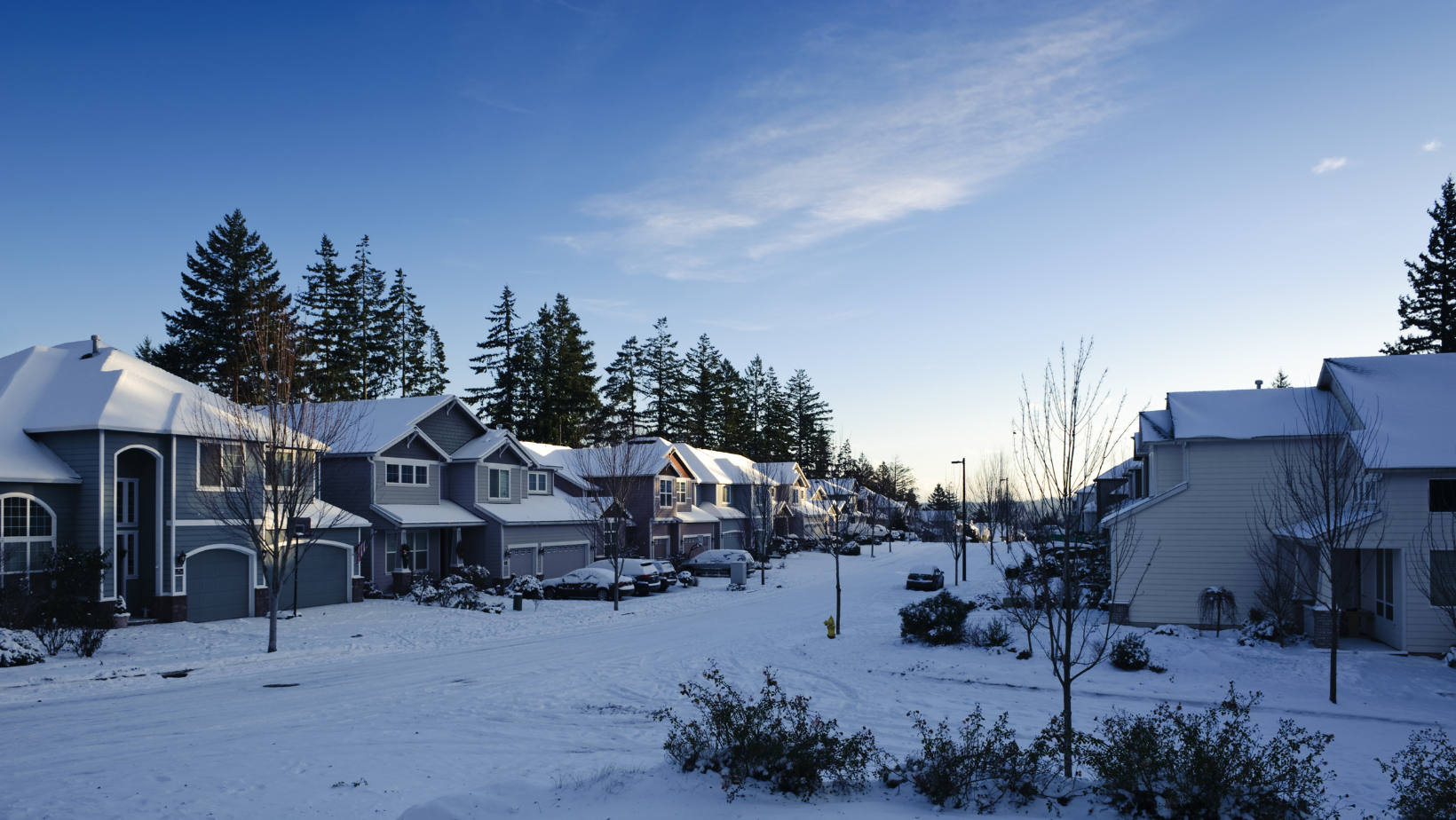Solar panels can be a great home investment — even in cold climates
Solar panels can work all year long, including during the winter. Even in cold-climate states that experience below freezing temperatures can benefit from a home solar energy system. Whether it’s cold or warm, a custom home solar panel system will continue to power all or most of your home’s energy needs.
Rooftop solar panels require sunlight to generate electricity, not heat. This means winter temperatures won’t impact your system’s performance. Solar equipment is even built to be durable during winter snow and rain.
For many homeowners, going solar can help reduce monthly utility bills by harnessing the sun’s clean energy into power. A custom solar system designed by Enact can reduce your electrical bill by 75% or more — thanks to our intelligent platform.
How do solar panels work during winter?
Solar panels work by harnessing sunlight and converting it into clean electricity, without carbon emissions or water usage. The sun emits radiation which is seen on earth through light, or electromagnetic radiation. Solar cells, portions of a solar panel, absorb this solar radiation — which creates an electrical charge that moves in response to an internal electrical field in the cell.
The photovoltaic effect is based on sunlight, not necessarily heat. This means as long as sunlight is presently shining on solar panels, electricity can be created. This clean energy can power all or most of your home’s daytime energy needs — and saves you money.
Winter in the northern hemisphere is experienced through shorter days, colder temperatures and in some areas — rain or snowfall. Diminished energy generation typically comes from moderate to heavy snow, thick cloud cover and shorter days. Despite the decreased energy production, solar energy is still worth it for many homeowners.
Every kilowatt of electricity created by your system is one less you consume from the grid, reducing your utility bills. In areas with greater seasonality — the averages of the summer and winter time months still make solar a strong investment.
In areas like California or Florida with less expressed seasonality, solar continues to work with sunny or partially sunny weather throughout the winter months.
Do solar panels work when it’s snowing?
Solar panels are designed to withstand cold temperatures and harsh environments — and can handle moderate amounts of snow.
A light dusting of snow might lower the efficiency of your panels, but you can still generate clean electricity. Even under a thin layer of snow, your panels can generate some energy.
Heavy snow may prevent your solar panels from generating electricity. Just like your rooftop, the snow will melt off the next sunny day or be blown off by the wind. Even if you live in an area with heavy snow, solar can still be worth it. The number of days with heavy snow will be less than sunny or partially sunny days.
Melting snow can slightly clean your solar panels for you, removing the build-up of dirt or dust and helping your system stay efficient. You will still need to schedule routine cleaning once or twice a year.
It is not advisable to remove heavy snow from rooftop solar panels yourself. There is a higher risk of bodily harm or death, damaging your solar investment and voiding your warranty.
Warranties generally only cover damage done by professional technicians or weather, not from user error.
Heavy snowfall can damage solar panels. While snow typically melts, blows or sublimates off the roof in a few days — if you notice excess snow, contact a solar professional. Solar professionals have the knowledge, safety equipment and cleaning equipment to properly remove excess snow. Professionals will take every step to minimize damage to your panels or void your warranty.

How to care for my solar panels in the winter?
In general, it is best to contact solar professionals in your area to protect your equipment, keep your warranty and prevent severe bodily harm. Solar panels have comparatively low maintenance costs compared to their savings.
Adjust solar panel angle: To maximize the amount of energy generation, you could contact your local installer to adjust the angle of your panels. By adjusting the panel angle, you may be able to catch more sunlight during the winter’s shorter days. Steeper angles not only capture more sunlight, but can also limit the accumulation of heavy snow.
A solar professional can adjust the solar panel angle using the mounting rack attached to your roof. While certain adjustments can’t be made — like a 10-15 degree difference — a small adjustment can help.
Carefully remove heavy snow: Usually, snow won’t cover all of your solar panels and will melt or blow off in a few days. Light snow will not damage your solar panels, but might lower your energy production. Heavy snow can accumulate after a storm or over time. Heavy snow can not only prevent energy generation but could damage your solar panels.
Contact a local solar professional to clear heavy snow from your panels. Your warranty likely won’t cover any damages made if you choose to remove the snow yourself.
Switch to energy efficient products: In the winter, there are shorter days and less sunlight. You might need to reduce unnecessary energy usage to avoid relying more on the grid. This can mean switching to energy efficient products, like light bulbs, and unplugging unused small appliances. For many people, this might not be practical so expect winter utility bills to be higher than summer bills.
Properly store your battery: Just like solar panels and smartphones, your storage battery has a recommended operating temperature. Some can handle short term, chilly weather — But it might be a good idea to store your battery in your garage or properly insulate if it’s stored outside. Talk to an Enact energy advisor or your local energy storage installer to be informed.

Solar panels and northern climates
Are solar panels worth it in northern climates?
Residential solar panels can absolutely be worth it for homeowners in the northern parts of the U.S. Solar panels thrive in northern climates, even during harsh temperatures. Colder, sunny weather improves the efficiency of solar panels. This means your solar panels can produce more energy per hour than during hot, summer months.
Solar cells require sunlight to produce electricity, not heat. While it’s true winter months see less sun in the Northern Hemisphere, solar can still be a sound investment. As long as your home gets ample sunlight, panels can generate low-cost, clean energy.
Some northern climates can see longer summer days as well. Energy usage typically peaks during summer months due to air conditioning. Solar energy can keep utility bills down during the summer months.
Can I go solar in my climate?
Unless your home is deep in an underground cave or shielded from sunlight by thick foliage, solar panels can power your home. The majority of homes can go solar in virtually any climate across the United States.
You can go solar and see savings across the U.S. — in snowy upstate New York or rainy Seattle. Wherever you are, there will be solar panels designed for your climate.
Regardless of where you live, solar can be a great option for you if:
- Own your home or business
- Have a suitable, shade-free area for solar panels, such as roof space in good condition without shade from trees, mountains or other buildings
- Are interested in making a long-term investment to lower your utility bill and generate clean, renewable energy
For more ease of mind, Enact’s energy advisors can address any questions or concerns you have about going solar. From solar panels to storage batteries, our advisors can determine the best solar energy system for your home in your area.
Our software can create a custom design for your home as we coordinate the entire installation process for you. The Enact advantage is having total transparency in the process — from cost to getting the right size solar system for your home.

Should I consider an energy storage battery?
Storage batteries are a great addition to home solar systems no matter where you live. As the name suggests, storage batteries store unused solar energy for rainy or snowy days, night time or power outages.
Electricity generated from solar panels has to be used by your home or it will be sent to the electrical grid — a storage battery lets you get the most out of your solar system.
For people in the northern U.S. — storage batteries can be great for when there are shorter days and days with thick cloud coverage. Even without solar energy. storage batteries can store electricity from the power grid for added energy independence.
Start your solar journey with Enact
Now that we know solar not only works during winter months, but can be a strong investment — it’s time to consider the benefits of home solar energy.
If you want to go solar or have questions, Enact’s friendly team of home energy advisors can answer questions and create a free custom solar quote for your home. Enact offers homeowners a customized solar system, designed for their specific needs.
What sets Enact apart from traditional solar installers is our transparency in pricing and throughout the entire process. We also offer consumers choice — our platform works with the vast majority of solar equipment.
After a short conversation, our energy advisors can determine the best system for your energy needs. Once we find the right system for your needs, Enact coordinates the entire installation process with a trusted local installer.
Enact will streamline the installation process for you. From start to finish, Enact is involved to ensure a high quality solar system. Enact coordinates the installation process and the steps needed for interconnection with your utility company.
Before you know it, your home will be powered by clean, renewable energy. Our software, used by many solar installation companies, makes the process simple and transparent.
If you want to go solar or have a few questions, you can contact our advisors for a free consultation to find what works best for your home.


